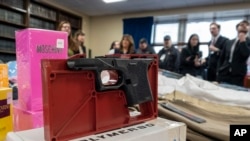The brazen killing of UnitedHealthcare’s CEO was likely carried out with a ghost gun, one of the nearly untraceable weapons that can be made a home, police said Monday.
A ghost gun is a firearm without a serial number, and police believe the one used in last week's shooting of Brian Thompson may have been made with a 3D printer. It was capable of firing 9 mm rounds. The man arrested in the crime, Luigi Mangione, also had a sound suppressor, or silencer, police said.
Ghost guns have increasingly turned up at crime scenes around the U.S. in recent years.
Here's a look at the weapons and efforts to regulate them:
What are ghost guns?
The firearms are privately made and have no serial numbers.
Generally, firearms manufactured by licensed companies must have serial numbers — usually displayed on the frame of the gun — that allow officials to trace the gun back to the manufacturer, the firearms dealer and original purchaser.
Ghost guns, however, are made of parts that the owner can assemble together. The critical component in building an untraceable gun is what is known as the lower receiver. Some are sold in do-it-yourself kits, and the receivers are typically made from metal or polymer. They include semiautomatic handguns and rifles.
Are they legal?
It is legal in the U.S. to build a firearm for personal use. Until about two years ago, ghost gun kits were available online that allowed people to assemble the weapons at home without background checks or age verification.
As police found more ghost guns at crime scenes, the Biden administration moved to add age requirements and background checks in 2022.
Buying one now is more like purchasing a regular gun at a gun shop.
The number of ghost guns has since flattened out or declined in several major cities, including New York, Los Angeles, Philadelphia and Baltimore, according to court documents.
But gun groups have challenged the regulation in court. The Supreme Court heard a case in October and seemed likely to uphold the regulation. It hasn’t yet handed down a ruling.
Where else have ghost guns been used?
The number of ghost guns recovered by law enforcement increased from 4,000 in 2018 to nearly 20,000 in 2021, according to Justice Department data. However, traditional guns are still used far more often in crimes.
Ghost guns really popped into the public consciousness in 2013 when John Zawahri opened fire on the campus of Santa Monica College in California, killing six people, including his father and brother. Zawahri, who was later shot and killed by police, had assembled an AR-15-style weapon after failing a background check at a gun dealer.
A gunman who killed his wife and four others in Northern California in 2017 built his own weapon to skirt a court order prohibiting him from owning firearms. In 2019, a teenager used a homemade handgun to fatally shoot two classmates and wound three others at a school in suburban Los Angeles.
A mass shooting carried out with an AR-15-style ghost gun left five people dead in Philadelphia in 2023. A ghost gun was also used in a shooting that critically wounded two kindergartners at a tiny religious school in Northern California last week, police said.




